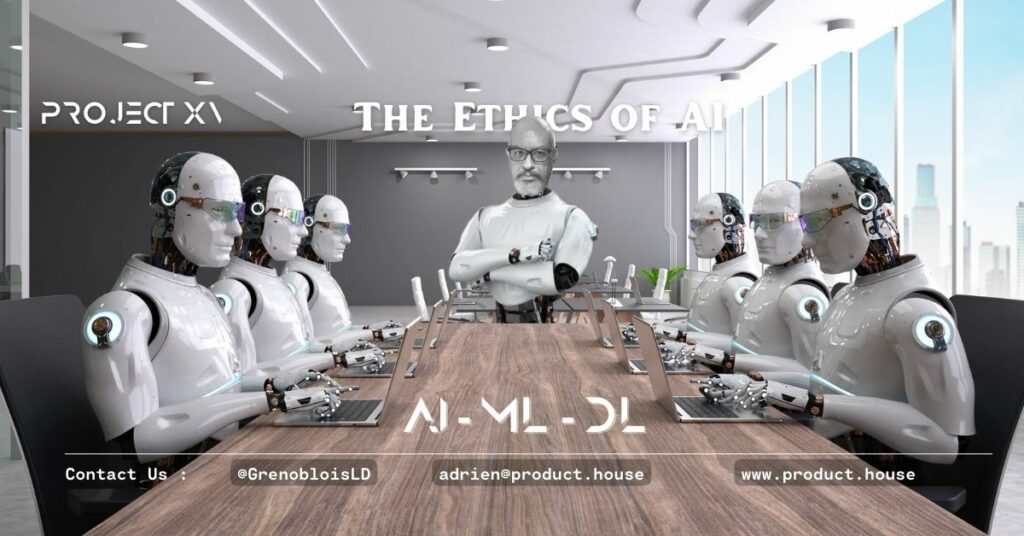The Ethics of AI: How to Ensure Responsible Development and Use of Artificial Intelligence

Artificial intelligence (AI) has the potential to transform our world in many positive ways, but it also raises important ethical questions that must be addressed. As AI becomes more advanced and integrated into our daily lives, it’s crucial to consider the ethical implications of this technology and ensure that it is being developed and used in a responsible and ethical manner. In this article, we’ll explore the ethics of AI and provide some guidelines for ensuring its responsible development and use.
Introduction
AI is a rapidly evolving technology that has the potential to change our world in many positive ways, from personalized healthcare to improved transportation. However, with these advancements come a number of ethical challenges that must be addressed to ensure that AI is being developed and used in an ethical and responsible manner.
Ethical Principles for AI
To ensure the responsible development and use of AI, there are several ethical principles that should be followed. These include:
- Fairness: AI should be developed and used in a fair and impartial manner, without discrimination or bias.
- Transparency: The development and use of AI should be transparent, with clear explanations of how decisions are made.
- Accountability: There should be clear lines of accountability for the development and use of AI, with individuals and organizations held responsible for any negative consequences.
- Privacy: The development and use of AI should respect individual privacy and data protection.
- Safety: AI should be designed and used in a way that ensures the safety of individuals and society as a whole.
Implementing Ethical Principles
To ensure that these ethical principles are being followed in the development and use of AI, there are several steps that can be taken. These include:
- Developing ethical guidelines and codes of conduct for the development and use of AI.
- Engaging in stakeholder consultations to ensure that diverse perspectives are taken into account.
- Encouraging interdisciplinary collaboration between experts in AI, ethics, and other relevant fields.
- Encouraging the use of open-source software and algorithms to promote transparency and accountability.
- Encouraging the development of diverse AI teams to prevent bias and ensure a wide range of perspectives are represented.
Implications for AI Developers and Users
AI developers and users have a responsibility to ensure that this technology is being used in a responsible and ethical manner. This includes:
- Conducting ethical risk assessments before developing and implementing AI systems.
- Ensuring that AI systems are designed in a way that respects privacy, data protection, and other ethical principles.
- Ensuring that there are clear lines of accountability for the development and use of AI.
- Ensuring that AI systems are safe and do not pose a risk to individuals or society as a whole.
Resources and Further Reading
If you are interested in learning more about the ethics of AI and its responsible development and use, there are many resources available to you. Here are a few recommendations:
Books:
- “Artificial Intelligence and Ethics” edited by Wendell Wallach and Colin Allen
- “Robot Ethics: The Ethical and Social Implications of Robotics” by Patrick Lin
Online Courses:
- “AI and Ethics” offered by Coursera
- “Ethics in AI” offered by edX
Experts in AI Ethics:
- Wendell Wallach
- Patrick Lin
- Joanna Bryson
Wendell Wallach is a Carnegie-Uehiro fellow at Carnegie Council for Ethics in International Affairs, where he co-directs the Artificial Intelligence & Equality Initiative (AIEI). He is also Emeritus Chair of Technology and Ethics Studies at Yale University’s Interdisciplinary Center for Bioethics.
Examples of Ethical AI:
- AI used in healthcare to improve diagnosis and treatment.
- AI used in environmental monitoring and resource management to promote sustainability.
- AI used in the criminal justice system to reduce bias and increase fairness.




